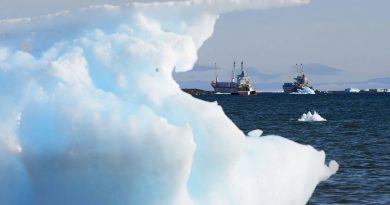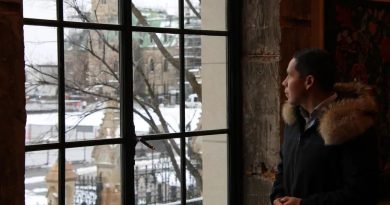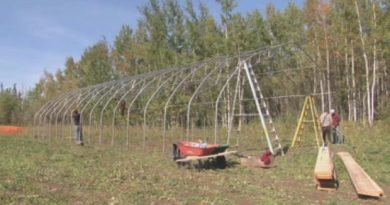Blog: ‘Nor night nor day no rest’ – Arctic diplomacy divided (and united)
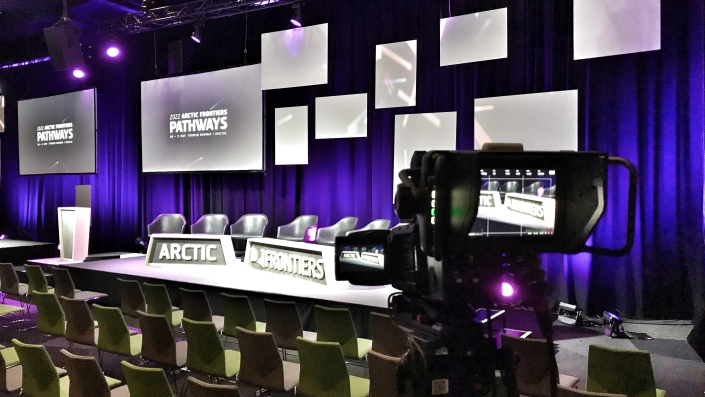
As the conflict in Ukraine continues, its political, economic and strategic effects have flowed outwards to adjacent regions and beyond. In the Arctic, many previous assumptions about regional politics and security are now being openly challenged, and in some cases completely cast aside.
With the Vladimir Putin regime facing ever-wider sanctions amid growing international isolation, almost all Arctic cooperation, including the far north’s cornerstone organisation, the Arctic Council, which would involve Moscow has been suspended.
No end point to the Ukrainian conflict is in sight, but at the same time the Arctic is facing serious questions about how its governments and its citizens can move forward in addressing its pressing regional challenges, chief amongst them being climate change. During the same week the invasion began, the Intergovernmental Panel on Climate Change (IPCC) released its latest report which featured (pdf) renewed warnings that the Polar Regions were experiencing accelerated ice erosion which would create tipping points in ecosystems at both poles.
Arctic cooperation may have been ‘paused’, but a common theme frequently cited during the recently concluded Arctic Frontiers conference in Tromsø was that the Arctic itself has no pause button. Environmental threats will persist in the region, regardless of who is and is not talking to whom. This year’s conference, postponed from January due to the omicron, was conducted in a hybrid format, and with a concentration on the various local impacts of climate change as well as ongoing challenges of sustainable development.
However, the Ukraine conflict was never far from any conversation at the conference, and panels included a discussion of how Arctic cooperation could go forward in the near term without Russian participation. It was stressed, including by panellist James DeHart, the Arctic Regional Coordinator for the US government, that there would be no initiative to replace the Arctic Council and that the organisation needed to eventually return to its original format.
As well, the Russian invasion of Ukraine was the subject of a specialised panel examining the effects of the war on the Arctic Council and overall regional governance. Among the sensitive topics addressed were how the chair position could be successfully passed from Russia to Norway, which is scheduled to take place in May 2023, and whether there would be changing patterns of Arctic cooperation sparked by the conflict and international responses.

During her speech at the Arctic Frontiers opening sessions, Norwegian Foreign Minister Anniken Huitfeldt confirmed that plans remained underway for Oslo to accept the chair position of the Council next year, and that issue-specific cooperation with Russian authorities would continue in the areas of border control, nuclear safety, search and rescue, and sustainable resource management. However, wider scientific and policy cooperation would not be possible under current conditions.
In Russia, the Putin government has reworked its own Arctic Council policy activities to reflect domestic concerns, while insisting (in Russian) that it would continue to assume its responsibilities as chair despite all meetings between Moscow and the other seven member governments being postponed indefinitely.
Amongst the looming questions over how the Ukraine conflict will affect the Arctic Council moving forward are whether there will be endeavours by the Western members of the organisation to continue cooperation in vital policy areas without Russia, and whether (and how) some sort of backchannel to Russian authorities could be created in order to maintain a minimal line of communication. There is also the complex issue of where the Council’s hiatus leaves the Permanent Participants, which represent Indigenous interests across the entire region, as well as the formal observers which include thirteen non-Arctic governments in Asia and Europe, many of which have also begun to expand their policies in the far north.
The problems of balancing global actions to condemn Russia’s unlawful attack on Ukraine with the need to maintain efforts to combat climate change in the far north were well illustrated in a speech adjacent to the Arctic Frontiers event, by Virginijus Sinkevičus, European Union Commissioner for the Environment, Oceans and Fisheries.
In his presentation at UiT – The Arctic University of Norway in Tromsø, he outlined the current and emerging human security threats facing the Arctic, including climate change effects, health in the emerging post-pandemic world, education, interests of Indigenous peoples, and regional development challenges. ‘There is no vaccine for climate change and biodiversity degradation’, he added.

Mr Sinkevičus also commented on the roles which the European Union could play in addressing these concerns, (‘The EU is in the Arctic, and the Arctic is in the EU’), including green and blue development plans such as the recent call for Arctic fossil fuels to remain in the ground, as well as the European Green Deal and the ‘Fit for 55’ policy, with its goal of the Union achieving carbon neutrality by 2050 and chopping greenhouse gas emissions by fifty-five percent in the next eight years.
The EU’s green policies now face stronger headwinds in light of rising oil prices and attempts by numerous governments, including in the EU, to halt future purchases of Russian oil and gas, while other Arctic oil producing states like Norway are facing pressures to increase their quotas, (although Norway is also facing possible strike action by eight thousand oil workers over wages).
The security map of the Arctic is also about to change as Finland and Sweden, two Arctic states which had traditionally maintained neutral security stances, (although both governments had joined the EU in 1995), confirmed their intention to join the North Atlantic Treaty Organisation (NATO), and formally submitted their membership applications on 18 May.
Should both countries enter the alliance, this would mean all seven Arctic Council members from western governments would be members, and the length of the borders separating NATO from Russia would more than double. Finland has an approximately 1340km-long frontier with the Russian Federation, stretching well north of the Arctic Circle.
Finnish and Swedish armed forces have long cooperated with their NATO colleagues, including in the most recent Cold Response military manoeuvres in Norway, including in the Norwegian north, which took place in March and April of this year, but another crucial question will be how overall military dynamics in the Arctic will change as a result of the two new applications.

The Russian government at first forcefully condemned the applications, although President Putin would later speak in a softer tone on the subject. However, in addition to economic aftershocks such as the suspension of Russian gas supplies to Finland last month, Moscow also strongly hinted that its approach to Arctic cooperation would need to be ‘adjusted’ in consideration of the potential NATO membership status of Finland and Sweden. This included comments by Nikolai Korchunov, Russia’s Senior Arctic Official, that there would need to be an assessment of whether trust between the country and the other Arctic governments would be adversely affected by NATO’s most recent expansion.
In contrast, a joint statement by Denmark, Iceland and Norway endorsed the applications, and both Canada and the United States also affirmed their support for swift admission to the alliance for both Nordic states.
However, the actual timetable for admission to the alliance is now clouded, mainly because of emerging opposition by the Recep Tayyip Erdoğan government of NATO member Turkey. President Erdoğan had previously accused the Finnish and Swedish governments of being sympathetic to the opposition Kurdistan Workers’ Party (Partiya Karkerên Kurdistan, or PKK), which the Turkish leader views as a terrorist organisation, and has also called for both Nordic states to remove an arms embargo on Ankara in the wake of 2019 Turkish military incursions into Syria. As a unanimous vote is required for any new members to be added to NATO, Turkey’s stance may represent a difficult obstacle.
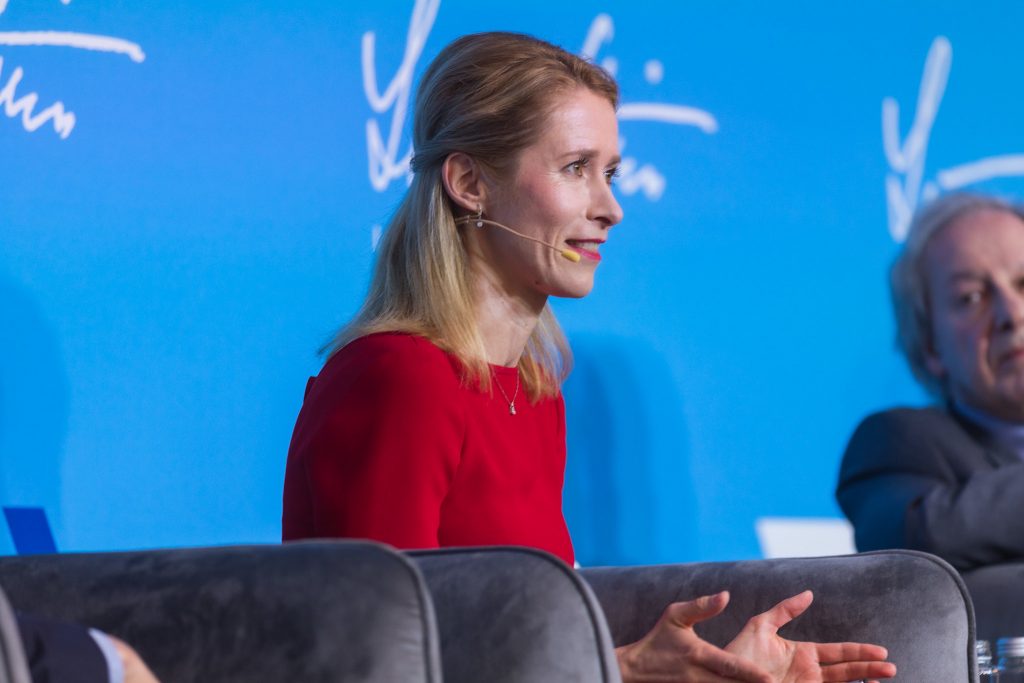
Both the Ukraine conflict and the potential expansion of NATO to include Finland and Sweden were at the centre of debates and discussions on European security at the Lennart Meri Conference (LMC) in Tallinn this month. Estonia, which is seeking to join the Arctic Council as an observer, and has published an Arctic policy document (pdf) in late 2020, also welcomed the NATO applications, as had Estonia’s Baltic neighbours Latvia and Lithuania.
Other participants at the LMC also welcomed the applications, and one common thread amongst the dialogue was the potential for further ties, including in the strategic realm, between Nordic and Baltic governments. The Baltic Sea may find itself ringed by NATO members along with the Russian enclave of Kaliningrad. Last month, Moscow had threatened to increase its military build-up in the Baltic Sea region, should Helsinki and Tallinn push forward with their NATO interests.
This year’s LMC, which included statements and comments by both Estonian Prime Minister Kaja Kallas and President Alar Karis, featured discussions on NATO’s new roles (video) and the potential expansion, as well as the various effects (video) of the Ukraine conflict on both European and Atlantic security. The theme of this conference was ‘Time Flees’ (video), and as Prime Minister Kallas stated, understanding history is key to understanding the significant events which have taken place over the past year in Europe, including attempts in Russia to silence opposition, revive imperial thinking, and to rewrite the past.

During comments made remotely at the event, Olha Stefanishyna, Deputy Prime Minister for European and Euro-Atlantic Integration of Ukraine, also stated at the conference that the outcome of the conflict will include a stronger and more unified Europe, as well as improved security ties with other major democracies, including Canada, the United States, and Japan.
Many scenarios have been posited for how the Ukraine conflict might end, but at present the effects of the war on the Arctic are already obvious on several fronts. What will be the implications of the growing militarisation of the Arctic on the region and its inhabitants? Will regional and international efforts to curtail climate change effects in the far north be sidelined, and if so for how long? What will be the impact on Arctic governance in the longer term, as well as on efforts to develop new forms of cooperation and regime-building? None of these questions has a ready answer as Arctic diplomacy takes on new and sometimes unpredictable forms.
Related stories from around the North:
Canada: Canada needs a ‘more consistent’ presence in North to bolster security, Inuit leader says, CBC radio
Finland: US military refuelling plane flies over Finland day after NATO announcement, The Independent Barents Observer
Norway: Defence minister says Norway must get stronger in the North, The Independent Barents Observer
Russia: Arctic Council chairman warns against Nordic NATO expansion, The Independent Barents Observer
Sweden: Seeking NATO membership is historic shift for Sweden, says PM, says expert, Radio Sweden
United States: U.S. Army poised to revamp Alaska forces to prep for Arctic fight, The Associated Press

